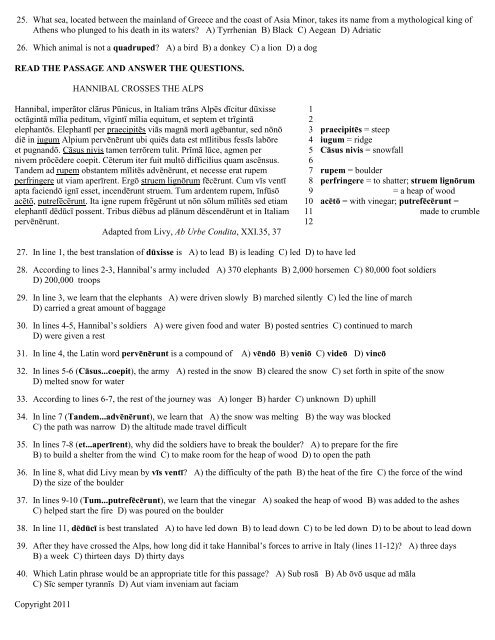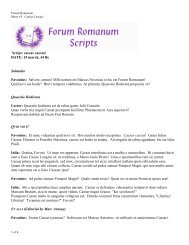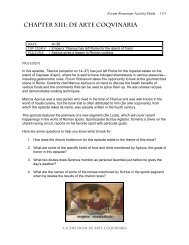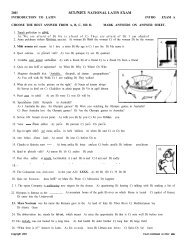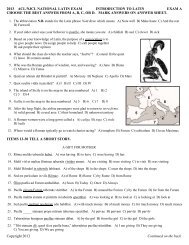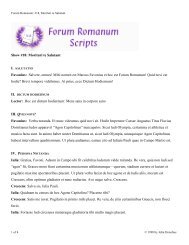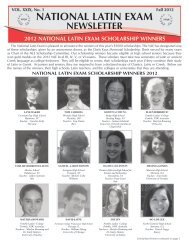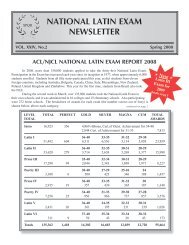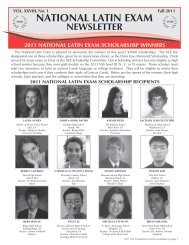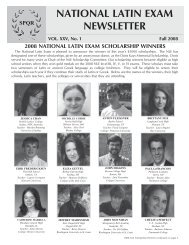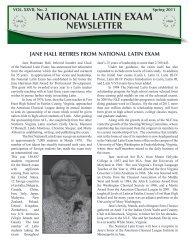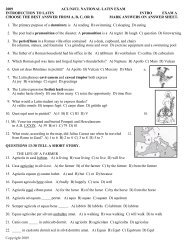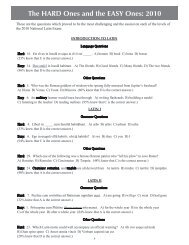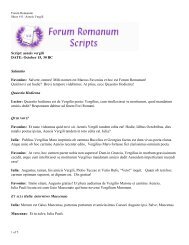2011 Intro Latin Exam - The National Latin Exam
2011 Intro Latin Exam - The National Latin Exam
2011 Intro Latin Exam - The National Latin Exam
Create successful ePaper yourself
Turn your PDF publications into a flip-book with our unique Google optimized e-Paper software.
25. What sea, located between the mainland of Greece and the coast of Asia Minor, takes its name from a mythological king of<br />
Athens who plunged to his death in its waters? A) Tyrrhenian B) Black C) Aegean D) Adriatic<br />
26. Which animal is not a quadruped? A) a bird B) a donkey C) a lion D) a dog<br />
READ THE PASSAGE AND ANSWER THE QUESTIONS.<br />
HANNIBAL CROSSES THE ALPS<br />
Hannibal, imperātor clārus Pūnicus, in Italiam trāns Alpēs dīcitur dūxisse 1<br />
octāgintā mīlia peditum, vīgintī mīlia equitum, et septem et trīgintā 2<br />
elephantōs. Elephantī per praecipitēs viās magnā morā agēbantur, sed nōnō 3 praecipitēs = steep<br />
diē in iugum Alpium pervēnērunt ubi quiēs data est mīlitibus fessīs labōre 4 iugum = ridge<br />
et pugnandō. Cāsus nivis tamen terrōrem tulit. Prīmā lūce, agmen per 5 Cāsus nivis = snowfall<br />
nivem prōcēdere coepit. Cēterum iter fuit multō difficilius quam ascēnsus. 6<br />
Tandem ad rupem obstantem mīlitēs advēnērunt, et necesse erat rupem 7 rupem = boulder<br />
perfringere ut viam aperīrent. Ergō struem lignōrum fēcērunt. Cum vīs ventī 8 perfringere = to shatter; struem lignōrum<br />
apta faciendō ignī esset, incendērunt struem. Tum ardentem rupem, īnfūsō 9 = a heap of wood<br />
acētō, putrefēcērunt. Ita igne rupem frēgērunt ut nōn sōlum mīlitēs sed etiam 10 acētō = with vinegar; putrefēcērunt =<br />
elephantī dēdūcī possent. Tribus diēbus ad plānum dēscendērunt et in Italiam 11 made to crumble<br />
pervēnērunt. 12<br />
Adapted from Livy, Ab Urbe Condita, XXI.35, 37<br />
27. In line 1, the best translation of dūxisse is A) to lead B) is leading C) led D) to have led<br />
28. According to lines 2-3, Hannibal’s army included A) 370 elephants B) 2,000 horsemen C) 80,000 foot soldiers<br />
D) 200,000 troops<br />
29. In line 3, we learn that the elephants A) were driven slowly B) marched silently C) led the line of march<br />
D) carried a great amount of baggage<br />
30. In lines 4-5, Hannibal’s soldiers A) were given food and water B) posted sentries C) continued to march<br />
D) were given a rest<br />
31. In line 4, the <strong>Latin</strong> word pervēnērunt is a compound of A) vēndō B) veniō C) videō D) vincō<br />
32. In lines 5-6 (Cāsus...coepit), the army A) rested in the snow B) cleared the snow C) set forth in spite of the snow<br />
D) melted snow for water<br />
33. According to lines 6-7, the rest of the journey was A) longer B) harder C) unknown D) uphill<br />
34. In line 7 (Tandem...advēnērunt), we learn that A) the snow was melting B) the way was blocked<br />
C) the path was narrow D) the altitude made travel difficult<br />
35. In lines 7-8 (et...aperīrent), why did the soldiers have to break the boulder? A) to prepare for the fire<br />
B) to build a shelter from the wind C) to make room for the heap of wood D) to open the path<br />
36. In line 8, what did Livy mean by vīs ventī? A) the difficulty of the path B) the heat of the fire C) the force of the wind<br />
D) the size of the boulder<br />
37. In lines 9-10 (Tum...putrefēcērunt), we learn that the vinegar A) soaked the heap of wood B) was added to the ashes<br />
C) helped start the fire D) was poured on the boulder<br />
38. In line 11, dēdūcī is best translated A) to have led down B) to lead down C) to be led down D) to be about to lead down<br />
39. After they have crossed the Alps, how long did it take Hannibal’s forces to arrive in Italy (lines 11-12)? A) three days<br />
B) a week C) thirteen days D) thirty days<br />
40. Which <strong>Latin</strong> phrase would be an appropriate title for this passage? A) Sub rosā B) Ab ōvō usque ad māla<br />
C) Sīc semper tyrannīs D) Aut viam inveniam aut faciam<br />
Copyright <strong>2011</strong>


